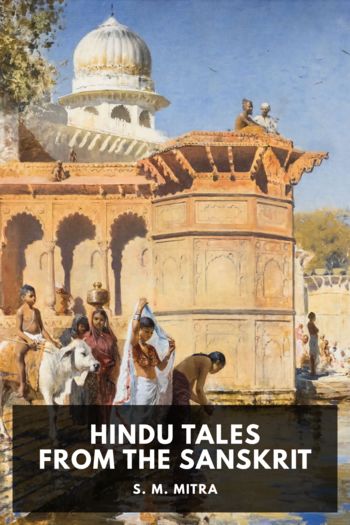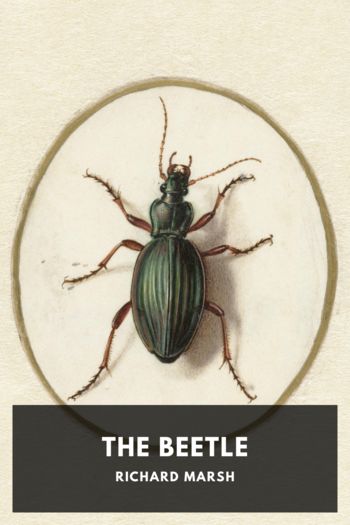Hindu Tales from the Sanskrit - S. M. Mitra (books suggested by elon musk .txt) 📗

- Author: S. M. Mitra
Book online «Hindu Tales from the Sanskrit - S. M. Mitra (books suggested by elon musk .txt) 📗». Author S. M. Mitra
Even Deva-Jnanin was astonished when he heard that; and so were all the other wise men. The king was delighted to find that after all he had made no mistake; and all the people who had been allowed to come in to see the trial were greatly excited. Shouting for joy the king called Hari-Sarman to come to the foot of the throne, and told him he would never, never doubt him again. He should have yet more money, a beautiful house in the country as well as the one he already had in the town, and his children should be brought from the farm to live with him and their mother, who should have lovely dresses and ornaments to wear.
Nobody was more surprised than Hari-Sarman himself. He guessed, of course, that there was a frog in the pitcher. And when the king had ended his speech, he said: “One thing I ask in addition to all that has been given me, that I may keep the pitcher in memory of this day, when my truth has been proved once more beyond a doubt.”
His request was, of course, granted; and he went off with the pitcher under his arm, full of rejoicing over his narrow escape. At the same time he was also full of fear for the future. He knew only too well that it had only been by a lucky chance that he had used the word Jihva in his first danger and Frog in the second. He was not likely to get off a third time; and he made up his mind that he would skip away some dark night soon, with all the money and jewels he could carry, and be seen no more where such strange adventures had befallen him. He did not even tell his wife what he meant to do, but pretended to have forgiven her entirely for the way she had neglected him when he was poor, and to be glad that their children were to be restored to them. Before they came from the farm their father had disappeared, and nobody ever found out what had become of him; but the king let his family keep what had been given to him, and to the end believed he really had been what he had pretended to be. Only Deva-Jnanin had his doubts; but he kept them to himself, for he thought, “Now the man is gone, it really does not matter who or what he was.”
The Hermit’s Daughter INear a town in India called Ikshumati, on a beautiful wide river, with trees belonging to a great forest near its banks, there dwelt a holy man named Mana Kanaka, who spent a great part of his life praying to God. He had lost his wife when his only child, a lovely girl called Kadali-Garbha, was only a few months old. Kadali-Garbha was a very happy girl, with many friends in the woods round her home, not children like herself, but wild creatures, who knew she would not do them any harm. They loved her and she loved them. The birds were so tame that they would eat out of her hand, and the deer used to follow her about in the hope of getting the bread she carried in her pocket for them. Her father taught her all she knew, and that was a great deal; for she could read quite learned books in the ancient language of her native land. Better even than what she found out in those books was what Mana Kanaka told her about the loving God of all gods who rules the world and all that live in it. Kadali-Garbha also learnt a great deal through her friendship with wild animals. She knew where the birds built their nests, where the baby deer were born, where the squirrels hid their nuts, and what food all the dwellers in the forest liked best. She helped her father to work in their garden in which all their own food was grown; and she loved to cook the fruit and vegetables for Mana Kanaka and herself. Her clothes were made of the bark of the trees in the forest, which she herself wove into thin soft material suitable for wearing in a hot climate.
IIKadali-Garbha never even thought about other children, because she had not been used to having them with her. She was just as happy as the day was long, and never wished for any change. But when she was about sixteen something happened which quite altered her whole life. One day her father had gone into the forest to cut wood, and had left her alone. She had finished tidying the house, and got everything ready for the midday meal, and was sitting at the door of her home, reading to herself, with birds fluttering about her head and a pet doe lying beside her, when she heard the noise of a horse’s feet approaching. She looked up, and there on the other side of the fence was a very handsome young man seated on a great black horse, which he had reined up when he caught sight of her. He looked at her without speaking, and she looked back at him with her big black eyes full of surprise at his sudden appearance. She made a beautiful picture, with the green creepers covering the hut behind her, and the doe, which had started up in fear of the horse, pressing against her.
The man was the king of the country, whose name was Dridha-Varman. He had been hunting and had got separated from his attendants. He was very much surprised to find anyone living in the very depths of the forest, and was going to





Comments (0)